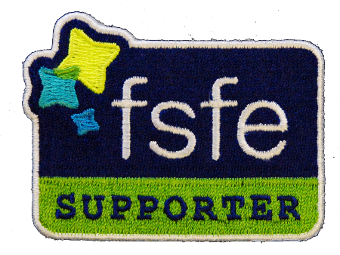EU Copyright review: The FSFE joins more than 80 organisations asking the EU member states to reject harmful Article 13
jeudi 30 novembre 2017 à 00:00A new copyright proposal is currently discussed by the EU co-legislators. Part of this proposal is Article 13 which can hamper our ability to collaborate with each other online as it imposes new monitoring obligations and installation of arbitrary upload filters on every code hosting and sharing provider. The Free Software Foundation Europe (FSFE) today raises its voice to save code sharing and joins 80 other organisations in an open letter towards the EU Council.
Free Software development often relies on code hosting platforms to build software together. Current ongoing EU copyright review, and in particular its Article 13 however, could hamper our ability to collaborate online with each other by imposing new obligations on every code hosting and sharing provider to prevent any possible copyright infringement in the form of arbitrary upload filters. In addition, the proposed Article 13 will oblige online platforms to monitor their users and actively seek for possible copyright infringements. However, there are no known filtering technologies that could accurately and reliably identify whether any Free Software is being shared in accordance with its terms and conditions. That means with such an Article 13 as currently proposed in the Council of the European Union (EU Council), software developers’ ability to share and collaborate in the development of source code would be limited.
Together with over 80 organisations, the Free Software Foundation Europe calls the EU member states to acknowledge the danger that Article 13 of the current EU Copyright Directive proposal poses to fundamental rights and freedoms, our economy, our education, our innovation, and our culture. And in order to address the issues Article 13 specifically poses on Free Software, the FSFE together with Open Forum Europe already launched Save Code Share and has published a White Paper to explain how Article 13 endangers our ability to build and share software online. We also ask individuals, organisations and companies to sign our Open Letter addressed to EU legislators to prevent harmful impact of Article 13 on collaborative software development and Free Software.
Support us today so we can make the voice of Free Software developers heard in this policy process.
Background on the policyThe main parliamentary effort in the copyright reform led by the Legal Affairs committee (JURI) will be voted upon in January 2018. However, several other parliamentary committees have issued their opinions on the matter. The most recent one by the European Parliament Committee on Civil Liberties, Justice and Home Affairs (LIBE), proposes to remove the most harmful provisions from Article 13, which means:
no to upload filters; no to general monitoring obligation to actively seek for any possible copyright infringement on their platforms.As a result, the LIBE opinion goes in the right direction to make sure that no content, including source code, is taken down because of 'potential' copyright infringement decided by the arbitrary filters. While LIBE's vote did not reject the harmful Article 13 as a whole, it still sends a clear message to the rest of the European Parliament that there is no place for arbitrary code filters when it comes to sharing Free Software online.
While European Parliament's main negotiating position regarding the EU copyright directive is yet to come, the co-legislator EU Council consisting of the EU member states representatives, however, seems to be taking a completely diverging direction, evident from their revised presidency compromise proposal on Article 13. EU Council's compromise proposal reinforces arbitrary removal of works hosted online.
In particular, the EU council proposal reinforces the European Commission's proposal to oblige online platforms, such as code sharing platforms, to prevent any copyright infringement on their platforms. It explicitly mandates to delete and block any content, including code uploads, as soon as the platform is notified of a potential infringement without any meaningful redress mechanism for users to contest that decision. Furthermore, it makes it an explicit responsibility of a platform to make sure that the same content is not being available elsewhere on the same platform, including for example all other projects that might have incorporated the same source code into their software. As a result any code repository or project can be disabled or taken down from online code hosting services at any time.
The EU Council's text is even more inconsistent in its proposals. Not only are platforms obliged to pre-block content, but they have to make sure the "preliminarily blocked content"' is made publicly available so the relevant rightsholders can "enforce their rights with regard to infringing works". The proposal mandates at the same time to both pre-block content upon uploading, and to make the same content publicly available simultaneously, in order to expand the number of possible copyright infringers for rightsholders to go after. Only then, platforms cannot be held liable for actions of their users, while demanding mutually exclusive actions from them. As a result, the EU Council's compromise proposal is introducing more legal uncertainty for online platforms and their users when it comes to sharing works online, including software.
Please become a supporter of the FSFE now, and enable our work!
Support FSFE, join the Fellowship
Make a one time donation

